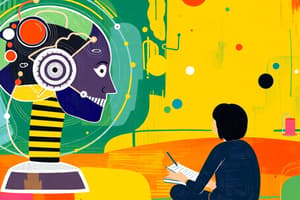Podcast
Questions and Answers
What is the '2-sigma problem' and how is it relevant to AI in education?
What is the '2-sigma problem' and how is it relevant to AI in education?
The '2-sigma problem' refers to the observation that students receiving personalized instruction can improve their scores by two standard deviations. It is relevant to AI in education because AI can provide this level of personalized tutoring to all students.
How does Khanmigo adapt to the individual needs of students?
How does Khanmigo adapt to the individual needs of students?
Khanmigo adapts to individual needs by understanding the context of a student's work and providing real-time feedback and personalized guidance.
In what ways can AI facilitate critical thinking skills in students?
In what ways can AI facilitate critical thinking skills in students?
AI can facilitate critical thinking by enabling Socratic-style discussions that encourage students to explore different perspectives and analyze various viewpoints.
What role can AI play in supporting teachers' workload?
What role can AI play in supporting teachers' workload?
What ethical considerations should be taken into account with AI in education?
What ethical considerations should be taken into account with AI in education?
Flashcards
2-sigma problem
2-sigma problem
A concept suggesting that personalized instruction can lead to significantly higher learning outcomes, with students showing an improvement of two standard deviations in scores compared to those receiving traditional education.
Khanmigo
Khanmigo
An AI-powered virtual tutor developed by Khan Academy that offers personalized guidance and feedback to students, adapting to their individual needs and understanding the context of their work.
Immersive AI learning
Immersive AI learning
The use of AI to create immersive, engaging learning experiences that enable students to interact with historical figures or engage in discussions with AI characters, fostering critical thinking and exploration of different perspectives.
AI support for teachers
AI support for teachers
Signup and view all the flashcards
Ethical AI in education
Ethical AI in education
Signup and view all the flashcards
Study Notes
AI in Education
- AI will revolutionize education by providing each student with a personal AI tutor.
- The "2-sigma problem," described by Benjamin Bloom in 1984, highlights the substantial improvement (two standard deviations) in student scores achieved through personalized instruction.
- AI can address educational disparities and provide customized learning experiences for all students.
Khanmigo
- Khanmigo, developed by Khan Academy, is a personalized AI tutor offering tailored instruction and support.
- Khanmigo uses AI to provide real-time feedback and individualized learning guidance.
- It understands the context of students' work and adjusts its materials to meet individual needs.
- Virtual writing coaches using AI can give students personalized feedback and suggestions for their writing.
Potential of AI in Education
- AI can create immersive, engaging learning environments enabling student interactions with historical figures and AI-based characters.
- AI facilitates Socratic-style discussions, fostering exploration of different perspectives and enhancing critical thinking skills.
- Personalized support and guidance are possible for students, assisting them with academic goals and career development.
AI Support for Teachers
- AI can create lesson plans, analyze student data, and provide personalized feedback to teachers.
- AI streamlines tasks like grading and student feedback, freeing teachers to focus on individual student interaction and instruction.
- AI provides teachers with tailored learning resources, including practice questions, lesson plans, and sample student responses.
Ethical Considerations
- The presenter recognizes ethical concerns related to AI in education but believes benefits outweigh the risks.
- Ethical development and implementation of AI prioritize student well-being and responsible practices.
- AI should support, not replace, human teachers and students, enhancing human intelligence and potential.
- AI can help close the education gap between students with differing resources.
Studying That Suits You
Use AI to generate personalized quizzes and flashcards to suit your learning preferences.
Description
Explore how artificial intelligence, particularly through tools like Khanmigo, is transforming education by offering personalized tutoring. The concept of the '2-sigma problem' highlights the potential for AI to significantly improve student outcomes through tailored instruction. Discover the innovative ways AI can support varied learning needs and enhance educational experiences.




